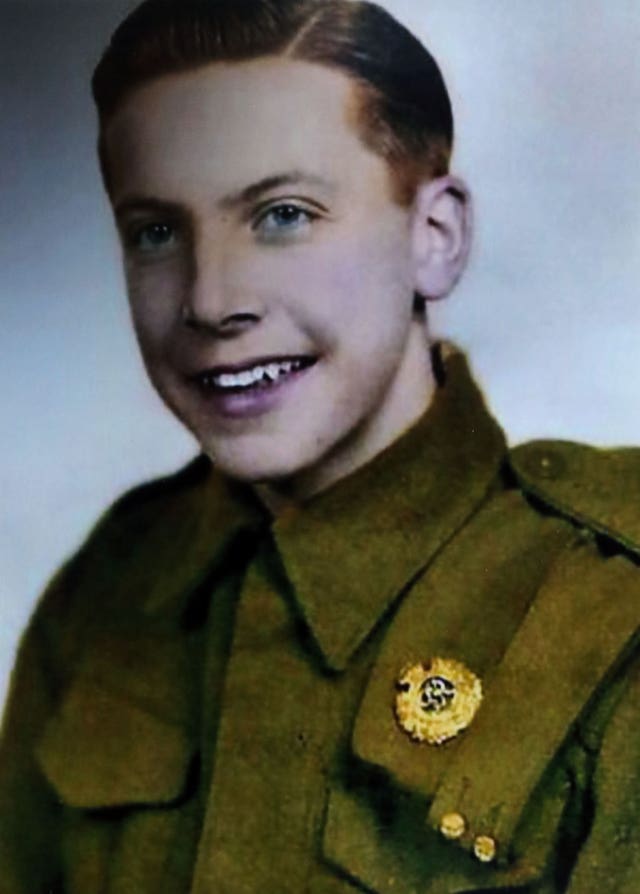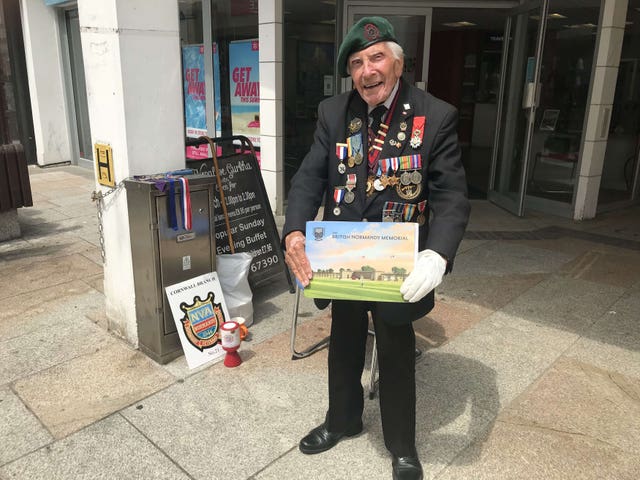The funeral of Mr Billinge, who died earlier this month aged 96, was held in his home town of St Austell on Tuesday.
26 April 2022
Hundreds of people have flooded the streets of a Cornish town to pay their respects to the late D-Day veteran Harry Billinge.
The funeral of Mr Billinge, who died earlier this month aged 96, was held on Tuesday.
Mr Billinge was 18 when he was one of the first British soldiers to land on Gold Beach during the Normandy invasion in 1944.
A sapper, also known as a combat engineer, he was attached to the 44 Royal Engineer Commandos and was one of only four survivors from his unit.
He was honoured by a funeral procession, which passed the war memorial cross outside Holy Trinity Church in his home town of St Austell, and a guard of honour, which included standard bearers, and Requiem Mass at St Paul’s Church in nearby Charlestown.
Mr Billinge was made an MBE in 2020 after raising more than £50,000 to build a national memorial honouring his fallen comrades – the 22,442 service personnel killed on D-Day and during the Battle of Normandy.


The year before, he told journalists: “I’m no hero, I’m lucky.
“All the heroes are dead and I’ll never forget them.”
During the hour-long service, led by the Revd Canon Malcolm Bowers, a eulogy was read by Nicholas Witchell, a journalist and founding trustee of the Normandy Memorial Trust.
Mr Witchell described Mr Billinge as a “wisp of a man with a winning smile” and spoke of his “selfless commitment to honour his friends”.
He said Mr Billinge arrived back from the war with “mental scars” and was appalled to see the events unfolding in Ukraine.
“‘War is a terrible thing’ he said, and he knew just how terrible.”
Let There Be Peace on Earth, a song singer and TV presenter Aled Jones recorded with Mr Billinge for his album Blessings in 2020, was played during the service.
Afterwards, bugle call The Last Post was played and a moment of silence was observed.
Items adorning Mr Billinge’s coffin included a bible, cross, poppy wreath, his picture, his Royal Engineers beret and a Union Jack pillow displaying his medals.
Revd Canon Bowers said: “He arranged this service only a few months ago when, I think, he realised his health was failing.
“He faced death with the same bravery he showed on the Normandy beaches.”
Hundreds attended to pay their respects to Mr Billinge, many gathering in St Austell and on the road outside the church in Charlestown.
The service was also livestreamed to a nearby community centre with seats for 120 people and aired on speakers outside the church.
Mr Billinge grew up in Petts Wood in Kent but lived in Cornwall for 70 years after being advised to leave London for a better quality of life.


He set up shop as a barber and became president of the local clubs for the Royal British Legion and Royal Engineers.
He is survived by his wife Sheila, daughters Sally and Margot, son Christopher and granddaughters Amy and Claire.
Mr and Mrs Billinge were married for 67 years and were due to celebrate their 68th wedding anniversary in August.
Six months ago, on October 26, he was able to visit Normandy to see a new memorial for fallen British soldiers.
In a tribute published on Monday, his family urged those wanting to honour Mr Billinge to become guardians of the British Normandy Memorial.
Margot Billinge said: “Harry was a very loving husband who always looked after mum. He was steadfast in his love for her.
“As a dad, he taught us great values: honesty, kindness, generosity and not to judge.
“Dad was always there to guide us. He was always a very charitable man and collected for the Poppy Appeal for over 65 years.


“When he got the brochure about the British Normandy Memorial in the post, he felt compelled to start collecting. In his efforts to raise money for the memorial, he found great peace.
“The original idea was to collect £1 for each of his comrades that died on the beaches – 22,442. But, of course, it amounted to much more than that. It gave him a purpose; meeting with members of the public kept him going.
“In an interview with the BBC a few years ago on Remembrance Sunday, I recall him saying he just wanted to be remembered as ‘a good old sapper who did his best’.
“He also said, ‘I hope I shall live in the hearts of people who won’t forget Harry’.
“Harry wanted future generations to never forget his comrades who fell in Normandy. If members of the public would like to pay their respects to Harry, we ask that they become guardians of the British Normandy Memorial.
“We would very much like the work towards the Memorial and the education centre to continue in Harry’s name.”



